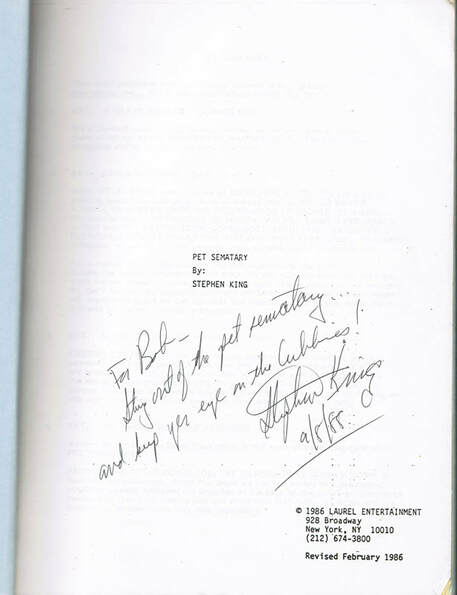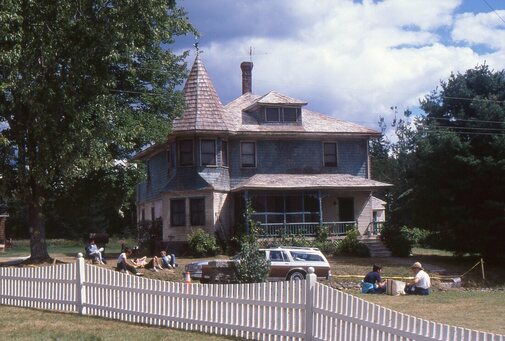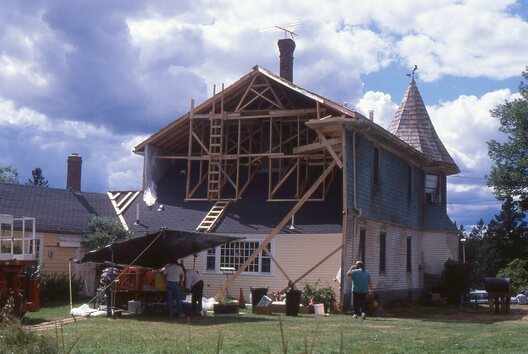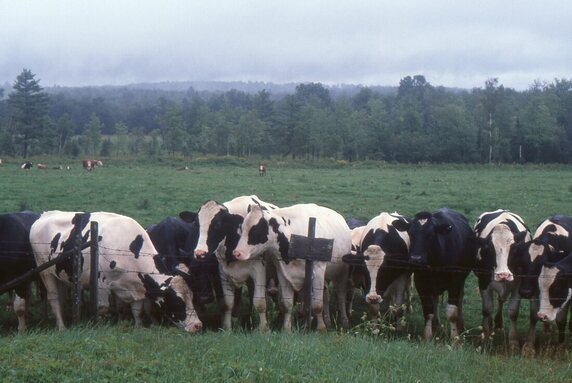|
This week's contestant is Sana Sarfraz from Agoura Hills, California. I found the hidden song extremely easy, though it took about 10 seconds for it to kick in, and I think most people have a good chance to get it, as well -- though the contestant (for a specific reason, I suspect) did not. As for the composer style, this is one of those I can toss a dice on because there are maybe half a dozen similar composers I can't significantly differentiate between. I thought it was one of them, but oddly confused him with the name of another I guessed -- and my guess was right...though it was an accident.
0 Comments
I've been seeing billboards and TV ads for a few weeks now promoting the remake of the movie based on Stephen King's novel Pet Sematary. They've caught my attention more than most remakes since (during my early, dark days when I was a kid and didn't know better and did movie publicity) I was the unit publicist on the original film of Pet Sematary. I'm not quite sure why they feel a remake is needed so soon after the first one -- it's not like it comes from another era, mind you, but 30 years ago in 1989 -- but they do, and so be it. One notable difference between this new version and the original, which is why I'm glad I worked on that one, is that the original had a screenplay by Stephen King himself. And since we shot the movie in Maine, not far from where he lived -- which was in his contract that we film in the state -- he visited the set periodically. We didn't talk a great deal, but did on occasion. And since I was always wearing my Cubs hat and he's a well-known Boston Red Sox fan, that always served as a good conversation opener. Our conversations, though not many, actually lead to probably my favorite story. Of any story I've ever told. My brother John was a bit of a curmudgeon. He hated things that were popular. (Once, when he came to Los Angeles for a visit, I asked if he wanted to go to Disneyland. When he said no, I asked why not, and he said, "Because I'm afraid I might like like it.) On the other hand, his wife loved reading books by Stephen King. She would ask John to read them, but no way in the world would he read a novel by Stephen King. Even if he had the time in the middle of his medical practice, Stephen King wasn't just a popular novelist - he was probably THE most popular current novelist in the world. Stephen King would not be read. But she didn't let up. And finally, John - the good husband - gave in. Okay, one Stephen King book. He read Firestarter. And he loved it so much that he finished the book in two days. Probably hating every moment that he liked it so much. Well, as fate would have it, not long after that, I was hired to work on Pet Sematary. As I said, when, Stephen King would visit the set we'd generally talk about baseball or (of course) the movie, since I was also interviewing him for the production noes I was writing on the making of the film. One day, though, I said I had a funny story for him, that I thought he would appreciate. I told him about my brother. I said he hated anything popular. I explained how my sister-in-law couldn't get my brother to read his books, specifically because they were popular. I went into great detail about who John was, and why the last thing on earth he wanted to do was read a popular Stephen King novel. And then I explained that John finally broke down, read Firestarter -- and absolutely loved it. Loved it so much that he finished it in two days. Now, you must understand, this is the Best Possible Reaction that any writer can ever have. It's one thing to be praised by fans - but it's something else entirely to have someone who is so deeply predisposed to hate your books that he's fought off reading them for years finally read one and love it so much that it's devoured. Stephen thought for a moment after being told all this, trying to figure what to say. It was clear he felt wonderful by John's reaction - which is pretty impressive, considering all the acclaim that Stephen King has had in his renowned career. And then he leaned over, looked at me and said - "Tell your brother, I apologize. I don't set out to write popular books. It's just that people buy them." (Not long after, I was back home in the Midwest and visited my brother who lived in Wisconsin. And I told John this story. His face lit up. One of the biggest smiles I've ever seen him make. "Stephen King said that about me???!" he asked. Yes - Stephen King said that about you. He laughed out loud, and said, with much pleasure, and an acknowledgement of his own inexplicable reaction to popularity - "You know, he's probably right." And he kept smiling.) I didn't take all that many photos of the production -- most of my pictures were of my trips around Maine on my days off, most notably to Arcadia National Park, Baxter State Park (which I particularly wanted to go to because L.L. Bean sells a 'Baxter State Park Parka'), Campabello Island, where FDR lived when he came down with polio, and had his recuperation there -- and was the subject of the classic play and subsequent movie Sunrise at Campabello (both starring Ralph Bellamy, who as whimsy has it went to my high school, New Trier. But I digress...) Interestingly, it's actually located in Canada, but has been made into an "International Park." I did take a few photos, though. This below is 'Jud Crandall's House,' where the taciturn character played by Fred Gwynne lived. I've previously told the stories of working with him on the film, which you can read here if interested. The short version is that I quite liked him. He was a bit crusty, but personal and direct. He'd done a great deal, was an accomplished artist, hit some highs and lows in his career, and didn't take kindly to fools, but if you were straight with him, he was good to be around. And contrary to what he may have said later in public -- perhaps it was to be diplomatic, perhaps he came to accept things -- at that time, he didn't hold much appreciation for The Munsters. He was grateful for the good it brought him, but it seriously mucked up his career after that, and he didn't want to talk about it. And this is the house from behind. It's only this rear that the production did additional work on -- the structure existed before we got there, but had to be filled out for the movie's needs. We filmed in an area known as Hancock Point, which is a bit outside the town of Ellsworth, about 25 miles from Bangor. The town leaders wanted to give the Key to the Town to the movie company, and since the breakfast "ceremony" for that took place at a local restaurant pretty early in the morning, none of the filmmakers wanted to get up that early. And so I -- as unit publicist -- was given the honor. I had to make a little speech, was very gracious (and meant it) and was presented with the key. I figured that since none of the people on the movie cared enough to go themselves to get the key, and it was presented to me...I would keep it. And still have it. I'm not sure what it will open up for me if I ever go back to Ellsworth, but I'm ready, just in case. I also recall that it was a big enough deal for us to film in the state that the governor showed up one day. (Checking records, since, no, I didn't remember, it was John McKernan, Jr., a Republican.) He told a wonderful story about Hancock Point that I included in the press kit. The short version was -- Back in World War II, the Germans wanted to get spies infiltrated in the U.S. so, Hanock Point being one of the easternmost parts of the country, they got a U-boat close enough to land and dropped two men off. They were dressed as locals and went walking through the point into town -- and almost immediately were spotted and arrested, but everyone knew everyone in that small, taciturn village that any stranger instantly stood out. One last photo. It has nothing to do with Pet Sematary, but it came during my time there and is one of my favorite pictures, although it's helped by the background. On one of my day's off, I decided to drive through the countryside. At one point, I passed a farm, and saw a large group of cows on the far side of the field. I stopped the car, and got out to look at them. What can I say, I like cows... And then I soon noticed something unexpected. It turned out that cows are incredibly curious. Because one-by-one, a cow would turn, spot me, and sloooooowwwwllly walk across the field to check me out. And then another. And another. And another. And... Well, I decided to wait to see what would happen. And this was the result. We all communed there for a while -- it would have been so rude of me to leave right after they had made the notable effort to graciously stop by and visit -- but then eventually it was time for me to head on. From their end, I'm guessing they returned back to the far side of the field. Perhaps discussing the whippersnapper in a Cubs cap. I have a lot of very good memories of working on the film, and some off-beat one, not just on the set, but traveling around the state. This includes some wonderful country-dining, a lot of blueberries and blueberry pie (Machias in northeast part of the state is the wild blueberry capital of the U.S.), going to a Triple-A minor league baseball game in Old Orchard Beach for the Maine Phillies, several trips to Freeport, the flagship home of L.L. Bean that's open literally 24/7 every day with countless factory outlet stores from other companies built-up around it, eating at "lobster pots" -- seemingly almost as ubiquitous and inexpensive there as McDonalds -- most memorably Bob the Lobster, understanding from the eerieness of parts of the state where Stephen King's stories come from, dismal Mexican food and an absence of a lot of ethnic food, and seeing a concert in town by Noel Paul Stookey -- Paul, of Peter, Paul and Mary -- who lived down the road in Blue Hill. I wish the remake well. But I'm very glad I worked on the original. The guest contestant on this week's NPR quiz show Wait, Wait...Don't Tell Me! is Aidy Bryant of Saturday Night Live. Her conversation with host Peter Sagal is exceedingly personable and spends a bit of time - understandable on a show that's broadcast from Chicago -- talking about her time in Chicago with The Second City.
This piece from this week's Full Frontal with Samantha Bee is both very funny and utterly infuriating. Reported by Alana Harkin, it looks at the MAVNI program, taking highly-educated, exceedingly-qualified and deeply-vetted undocumented immigrants and offered them citizenship if they joined the military -- and how the Trump administration has dismantled it. Here's the latest from Randy Ranbow. It's especially timely, so there's less production than usual, though a lot of use of effective clips edited in. It's also not as funny as most of his other song parodies, but that's sort of the point of it, I think. And it wonderfully captures the sort of schizoid nature of the topic -- appropriate too for the Sondheim song its based on from Follies, which probably won't be well-known to most people, the tour de force number, "The God-Why-Don't-You-Love-Me Blues." Lest it be accepted as normal given the source, it must be noted -- whether you've been offended in the past by such language or not (and most people claiming a platform of "morality" have been) -- a president saying "Bullsh*t" to a rally is not normal.
|
AuthorRobert J. Elisberg is a political commentator, screenwriter, novelist, tech writer and also some other things that I just tend to keep forgetting. Feedspot Badge of Honor
Archives
June 2024
Categories
All
|
|
© Copyright Robert J. Elisberg 2024
|











 RSS Feed
RSS Feed